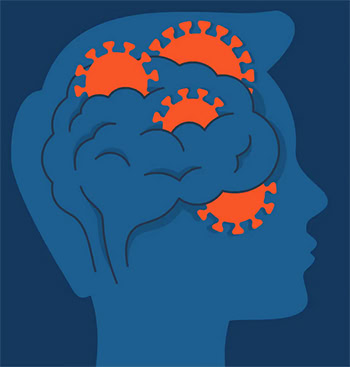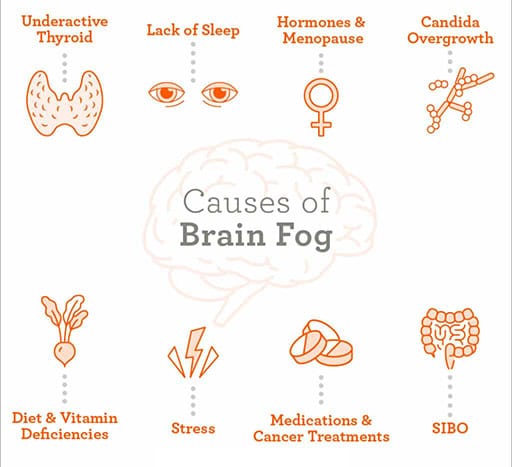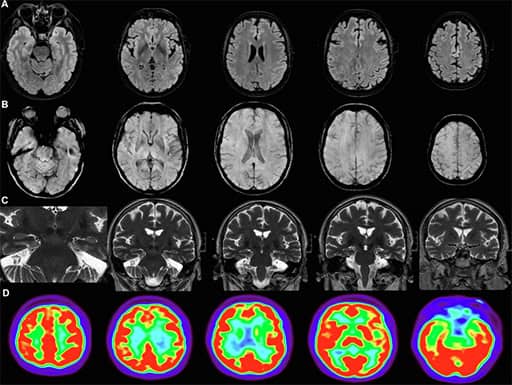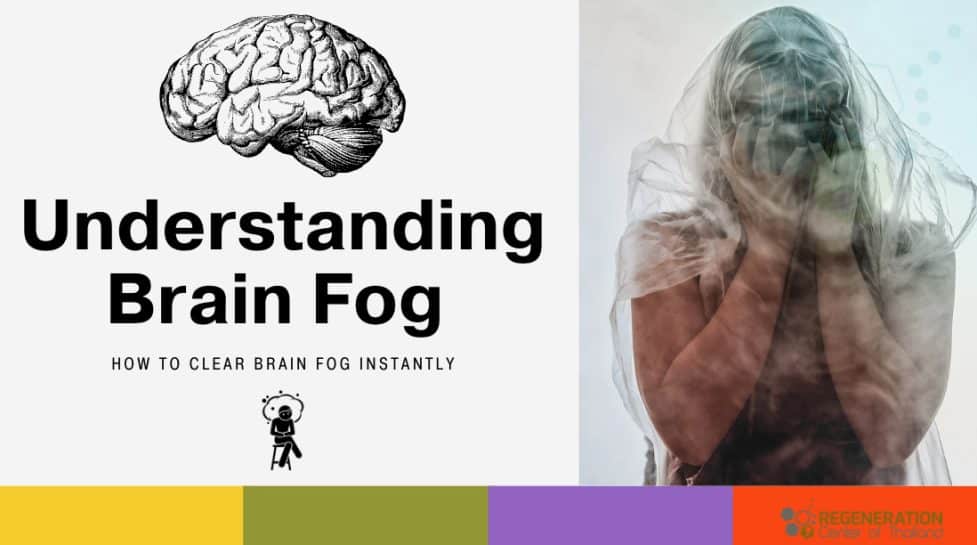‘Brain fog’ is a colloquial term for feeling scatter-brained, confused, forgetful, or mentally impaired.
“Where did I leave my keys?“
 When we reach “a certain age,” we all have these moments. Some people call it brain cloud, some call it brain fog, but most people just accept it as part of getting older. But is that always true? Brain fog is not really a medical condition that can be diagnosed, but it might be a warning signal of a different underlying health problem that should be identified and addressed.
When we reach “a certain age,” we all have these moments. Some people call it brain cloud, some call it brain fog, but most people just accept it as part of getting older. But is that always true? Brain fog is not really a medical condition that can be diagnosed, but it might be a warning signal of a different underlying health problem that should be identified and addressed.
“What was i was saying again?“
From autoimmune diseases like connective tissue disease to long-covid or some neurodegenerative diseases like Parkinson’s, brain fog is often one of the standard early warning signals that should not be ignored. According to a recent study published by the Journal Annals of Clinical and Transnational Neurology, The neurological symptoms from a viral infection long-term, can include brain fog, tingling, numbness, dizziness, headaches, ringing in the ears (tinnitus), blurred vision and fatigue. This is one of the most extended follow-up studies of neurological symptoms of long Covid patients who were never hospitalized. At The Regeneration Center, brain fog is amongst the top symptoms that patients report as reasons why they seek out stem cell therapy for anti-aging and wellness.
Cognitive fog, Foggy brain, or hazy thoughts can be experienced in several ways, including:
- Poor concentration
- Memory troubles
- Frequent Lack of mental clarity
- Inability to focus for extended periods
Brain fog symptoms can result from stress and mental fatigue from long periods of concentration or intense work. In many cases, getting enough quality sleep is the best solution, as it helps our bodies metabolize vital elements more efficiently. However, patients with severe or chronic brain fog cannot be treated through rest or exercise and should be evaluated appropriately. If brain fog interferes with your school, job, or home life, it’s time to pay attention and take it seriously.
How long does Brain fog last?
For most cases, the good news is that early intervention can provide easy treatment options so that chronic brain fog is not something patients are doomed to endure for their entire life.
What Are Some Causes of Brain Fog?
People experience brain fog for several reasons, so early intervention and identifying the root underlying causes is critical in helping to resolve that loopy feeling and hazy thoughts in the head. Through proper diagnosis and early intervention, many patients are surprised to learn that symptoms they did not think were connected to brain fog are also resolved.
Six common causes of Brain fog
1) Lack of Quality Sleep – Not getting quality sleep is a classic precursor of brain fog. Poor sleepless nights interfere with our brain’s ability to function correctly. Many often shrug off the importance of getting quality 8 or 9 hours of sleep every night. To ensure you sleep well, focus on what may be blocking you from sleeping and causing insomnia. When the brain is tired, it becomes harder to think, reason, and focus.
2) Stress—Stress takes a tremendous toll on the body and mind and has been well documented for centuries. Chronic symptoms of physical and mental stress can include elevated blood pressure (hypertension), a weakened immune system, and frequent depression. When people are always stressed out, their brains become exhausted. Frequent stress can lead to poor concentration, Mental fog, and cloudy thoughts.
3) Medications (Prescription and Over The Counter) – Brain fog is a prevalent side effect of some medications. Sometimes, this can be fixed as quickly as adjusting the dose or changing the medication brand. Patients should avoid making random adjustments without talking with their doctors first. Brain fog is also commonly associated with patients who have chemotherapy for cancers including: Pancreas cancer, liver cancer, prostate cancer, kidney cancer and lung cancer.
4) Hormonal changes due to age – As we age, hormones begin to affect men and women equally. Brain fog as a symptom is proven to be linked with a reduction in hormone levels. For men, this is associated with lower levels of testosterone, and for women, shifts in the production of progesterone and estrogen cause several symptoms, including brain fog. Brain fog related to aging is among the most common symptoms caused by hormonal shifts and can result in frequent bouts of forgetfulness, cloudy thinking, and poor concentration.
5) Poor Diet – Research has proven that there is a direct link between mental acuity and what we digest. For some patients, brain fog can result from deficiencies in vitamin cobalamin (B-12). B-12 is a water-soluble vitamin in our metabolism and is essential to normal, healthy brain function. Other dietary factors, such as food allergies to dairy, aspartame, or nuts, can also cause biochemical imbalances, triggering symptoms such as lethargy and so brain fog.
Common food allergies & sensitivities to:
- Aspartame (Equal, NutraSweet, NatraTaste Blue)
- Monosodium glutamate (MSG)
- Dairy Products
- Peanuts
To avoid triggering feelings of aspartame brain fog, get a food allergy test and remove certain foods from your diet to see how it can impact mental sharpness.
6) Medical Illnesses, Diseases, and Disorders—Brain fog can often be traced to changes in blood glucose levels (diabetes type 2). Lupus, Chronic fatigue syndrome, pancreatitis, and fibromyalgia are just a few examples of medical conditions that can affect the way you think and your cognitive function.

Other diseases, syndromes, and disorders that can cause brain fog include:
- Sjögren Syndrome
- Anaemia
- Migraines
- Dehydration
- Lyme Disease
- Depression
- Stroke
- Alzheimer’s Disease
- Onset MND
- ALS
- Peripheral neuropathy is caused by damage to neurotransmitters
- Autoimmune Diseases (such as ankylosing spondylitis, rheumatoid arthritis, multiple sclerosis, MS brain fog)
- Transverse myelitis
- SIBO brain fog – Small intestinal bacterial overgrowth
- Hypothyroidism
- Crohn’s & Ulcerative Colitis
What is Chemo Brain?
“Chemo brain” is a ubiquitous term used by cancer survivors around the world to describe memory and thinking problems that often occur both during and after cancer treatments. Chemo brain is also called chemo fog, cognitive dysfunction, and cancer-related cognitive impairment syndrome.
Diagnosis of Brain fog and Dizziness
Since brain fog is a symptom and not a disease/root cause, a single blood test, genetic screening, or radiology scan cannot correctly diagnose the root cause. The diagnosis stage is done over time through the process of elimination, so it’s important that patients try to be aware of when brain fog is occurring and if it is a sign of illness or possibly side effects from other issues such as medication.[1] Keeping track of sleep quality, diet, or stressful events can help. To help your doctor understand your medical needs, have records and personal notes ready when you go in for an evaluation. Some helpful information needed for precise diagnosis can include:
- Current mental health status
- Dietary Intake
- Frequency and Level of Physical Activity
- List of current medications, including OTC Supplements
Common Brain fog causes
Tell your doctor about any other symptoms you might be experiencing, including:
- Dry Skin
- Hair Loss
- Changes in Appetite
- Brittle Nails
- Changes in Weight
Tests to help detect & eliminate brain fog include:
- Liver Function Test
- Thyroid Function Test
- Blood sugar test for abnormal Glucose Levels
- Kidney Function Test
- Nutritional deficiency Test
- Test for Infections (Viral and Bacterial)
- Sample of Cerebrospinal fluid (lumbar puncture)
- Test for Inflammatory Diseases
Samples from cerebrospinal fluid can be especially helpful in revealing any elevated levels of proteins suggestive of inflammation. The presence of these unexpected antibodies is usually found in patients with compromised or activated immune systems.
Can anxiety cause brain fog?
Other antibodies found in blood and cerebrospinal fluid are unique to the samples from cerebrospinal fluid, suggesting the presence of brain inflammation.[2] Depending on your symptoms, your physician may also recommend radiology scans like X-rays, MRI, Ultrasound, or CT scans. Doctors may also recommend allergy testing and sleep studies.
Natural cures for brain fog include:
- Proper Sleep (At least 8 to 9 hours of sleep every night )
- Seek out physical activities that you enjoy
- Reduction in consumption of alcohol and caffeinated beverages
- Moderate levels of exercise every week
- Cold water immersion or cryotherapy may help reduce neuroinflammation and improve mental clarity by enhancing circulation and lowering stress hormone levels.
- Exercise the brain by learning something new. This can include classes, hobbies, or brain puzzles and games.
- Eat more fruits, protein, veggies, and healthy fats like avocados.
The Importance of Exercising The Brain
Physical fitness and exercise are crucial in relieving brain fog and improving overall health. However, exercising the brain is one well-established and essential element that continues to be overlooked.[3]
Exercising the brain can be beneficial in many ways, including:
- Helping to retain mental sharpness as we age
- Alleviates brain fog
- Reduces symptoms of depression
- It keeps us engaged in the world and increases knowledge
How to get rid of brain fog
While the brain is not a muscle, it can be strengthened and improved through mental exercise, like the body’s muscles are strengthened and enhanced through physical exercise. That is why many people liken the brain to a muscle.
The brain is not a muscle, but it should be exercised like one.
Just as full-body physical exercise is needed to be effective, a mental workout should also exercise as many brain regions as possible. Here are several ways to give your brain a total workout. Try them; you may be surprised how much they help relieve your brain fog!
Memory Exercises
Memory is a common brain function that diminishes when we age. In many cases, this slow memory loss can be distressing and debilitating. This is because memory plays a vital role in many other cognitive abilities. Brain fog that accompanies memory loss only worsens with age and when we struggle with memory issues.
Mental exercises to help strengthen and retain memory are easy. They take very little time and are inherently engaging, effectively reducing brain fog. Engagement also makes them stimulating and entertaining. This is no small matter. It’s been proven that the more we enjoy doing something, the more inclined we are to do it consistently.
Improve your memory by singing.
One easy memory game that works great for memory loss and brain fog symptoms is learning to sing a new song. Choose any music you enjoy, find a new song, and work on memorizing the lyrics. This simple exercise helps keep memories sharp and makes you popular with your friends on karaoke night!
Another simple but effective memory game is entering a room and focusing on five random objects. Be sure to take a mental note of what they are and where they are located inside the room. Then, leave the room and try to recall each object using as much detail as possible. Then re-enter the room and see how you did. For more precision, set a timer for about 2 hours and then retest how well you remember the object details and location.[4]
Comprehension exercises can also help your brain maintain or increase its level of understanding. A straightforward way is to learn a new word every day. There are dozens of ways to do this, beginning with simply picking a random word from a dictionary. Some people find it more interesting to choose from a style of writing they usually don’t read. For example, reading from a section in entertainment news might not be your usual first choice, but it could help you learn a new word or work of art. Alternatively, read a novel or nonfiction book that covers an unfamiliar topic. This exercise can increase the chance of discovering a broad range of new words you were unfamiliar with, prompting your brain to focus, concentrate, and comprehend their meanings.
Focus Exercises – Developing better focus and attention throughout the day is more important than ever. Our modern world is filled with distractions, so having a healthy attention span is even more critical in today’s society than in centuries past. One game to help improve focus is to practice mindfulness when performing an act. For example, when washing your dishes, pay as much attention as possible to that specific task. Notice how hot or cold the water is, the texture of the sponge in your hand, the smell of the dishwashing liquid, and the textures and shapes of the dishes you’re washing.
What does brain fog feel like?
Learning to focus can be difficult at first, so begin with an easy goal of practicing 5 minutes daily. Take this daily ritual seriously, and don’t let distractions lure you from spending dedicated time. As you slowly improve, gradually increase the amount of time to a level that fits your daily schedule.
Executive Functions – Executive functions are a group of cognitive processes necessary to control behavior. It is our brain’s ability to use logic and reason when solving a problem. Brain cognitive games that require fast decision-making are a fantastic way to improve executive function quickly. Several online sites, such as Luminosity and Mind Games, have hundreds of free fun games you can use to exercise many different brain functions.
Some other ways to naturally improve memory and focus include:
- Learn a new dance move
- Learn another language
- Language or math puzzles, such as sudoku
- Learn a new life skill, such as painting, woodworking or cross-stitching
Treatments for Brain Fog
Traditional treatments for brain fog require addressing whatever the underlying symptoms are. For anemic patients with brain fog, a doctor may recommend adding iron supplements to help boost red blood cell production and thereby reduce brain fog. Alternatively, patients with autoimmune diseases that are causing damage to tissue, organs, or nerves may be recommended some biological medication.
Stem Cell Treatment For Brain Fog
 Several factors can cause brain fog, but certain features are distinctly associated with the condition, including damage to specific organs such as the lungs or heart. Patients with COPD and IPF lung disease experience shortness of breath, while patients with heart disease often report having frequent heart palpitations in addition to hazy memory and brain fog. Others experience significant inflammation, which an overactive immune system can cause. Impaired cognitive symptoms have also been identified in several viruses, including COVID-19, HIV, coronaviruses MERS & SARS, Epstein-Barr virus, and hepatitis C.[5]
Several factors can cause brain fog, but certain features are distinctly associated with the condition, including damage to specific organs such as the lungs or heart. Patients with COPD and IPF lung disease experience shortness of breath, while patients with heart disease often report having frequent heart palpitations in addition to hazy memory and brain fog. Others experience significant inflammation, which an overactive immune system can cause. Impaired cognitive symptoms have also been identified in several viruses, including COVID-19, HIV, coronaviruses MERS & SARS, Epstein-Barr virus, and hepatitis C.[5]
Common signs of an activated immune system include elevated levels of circulating cytokines and abnormal T-cell activity. Over time, this chronic immune system dysregulation leads to fatigue and neurological symptoms. If the inflammation and scarring are not treated early, it can eventually cause permanent neurodegeneration. While MSCs+ stem cell therapy cannot directly target the symptoms of brain fog, it can target the underlying cause via immune system modulation and cellular differentiation into other vital cell types in the human body. The Regeneration Center uses tissue-specific stem cells, including:
- Endothelial Cells—These cells form a single cell layer lining all blood vessels in the body to regulate the exchanges between tissue and the bloodstream. Chemical signals from isolated endothelial cells can organize the growth and redevelopment of connective tissue cells in the layers of the blood vessel walls.
- Neural stem cells, including astrocytes – Neural stem cells are self-renewable, multipotent cells that help create radial glial progenitor cells, which help create all neurons and glia in the Central nervous system (CNS)
- Heart stem cells – multipotent cells that are self-renewing and help create coronary vessels along with heart muscle cells known as cardiomyocytes
- Liver cells and Hepatocytes
- Stem cells specific Tendon (Tendon Stem cells), cartilage stem cells, bone cells, and muscle cells
- Hematopoietic stem cells from bone marrow or peripheral blood
How to treat brain fog
Isolated and enhanced Mesenchymal stem cells initiate repair for organ injuries by replacing the damaged cells with new cells or initiating the body’s repair system via the paracrine (cell signaling) mechanism. When appropriately used, isolated and expanded MSCs+ stem cells can improve the functionality of damaged organs in the body, which helps to alleviate the underlying negative symptoms such as heart palpitations and shortness of breath that can lead to chronic brain fog.
Persistent sabo brain fog can indicate a more serious medical condition. Don’t just shrug it off and blame it on “getting older.” Many illnesses, injuries, and disorders affect brain function and focus. The sooner you understand the cause of your brain fog, the sooner the health reason behind it can be identified and treated.
At the Regeneration Center, we use functional medical therapies to address various conditions related to cognition impairment due to brain injuries and brain fog.
Published Clinical Citations
[1] ^ Meeusen, R., Van Cutsem, J., & Roelands, B. (2021). Endurance exercise-induced and mental fatigue and brain fog. Experimental physiology, 106(12), 2294–2298. https://doi.org/10.1113/EP088186
[2] ^ Theoharides, T. C., Cholevas, C., Polyzoidis, K., & Politis, A. (2021). Long-COVID syndrome-associated brain fog and chemofog: Luteolin to the rescue. BioFactors (Oxford, England), 47(2), 232–241. https://doi.org/10.1002/biof.1726
[3] ^ Stefano, G. B., Ptacek, R., Ptackova, H., Martin, A., & Kream, R. M. (2021). Selective Neuronal Mitochondrial Targeting in SARS-CoV-2 Infection Affects Cognitive Processes to Induce ‘Brain Fog’ and Results in Behavioral Changes that Favor Viral Survival. Medical science monitor: international medical journal of experimental and clinical research, 27, e930886. https://doi.org/10.12659/MSM.930886
[4] ^ Conti, P., D’Ovidio, C., Conti, C., Gallenga, C. E., Lauritano, D., Caraffa, A., Kritas, S. K., & Ronconi, G. (2019). Progression in migraine: Role of mast cells and pro-inflammatory and anti-inflammatory cytokines. European journal of pharmacology, 844, 87–94. https://doi.org/10.1016/j.ejphar.2018.12.004
[5] ^Asadi-Pooya, A. A., Akbari, A., Emami, A., Lotfi, M., Rostamihosseinkhani, M., Nemati, H., Barzegar, Z., Kabiri, M., Zeraatpisheh, Z., Farjoud-Kouhanjani, M., Jafari, A., Sasannia, S., Ashrafi, S., Nazeri, M., Nasiri, S., & Shahisavandi, M. (2022). Long COVID syndrome-associated brain fog. Journal of medical virology, 94(3), 979–984. https://doi.org/10.1002/jmv.27404

